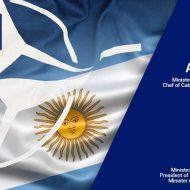Today, in Latin America, as in other parts of the world, factual powers are developing and consolidating while imposing a specific functioning and orientation on capitalism. This is not always recognized, as they move outside the discourses of democracy. They circulate the world in impunity, they move in an area where there is no rule of law. Factual powers impose on states but also on peoples. According to the Mexican researcher Ana Esther Ceceña, these powers may be grouped together in three fields, each with its own dynamics and characteristics: multinationals, military power and illegality. Let us take a look at the first them in relation to the rest of those mentioned, taking the cases of Argentina and Brazil, exposed in the framework of a capitalist development on a regional scale.
Transnational companies
Transnational companies have a recognized capacity to put themselves above the states, above any regulatory attempt, while at the same time they need the state, they use it and they determine it. Extractivist multinationals stand out in the American continent. By extractivism we understand the large-scale exploitation of natural and common resources, with a high degree of standardization and the use of technology; capital-intensive activities, which obtain products with low added value, normally destined for export, whose activity has great destructive consequences on nature, often with irreversible consequences or slow and arduous recovery.
The productive export specializations in many Latin-American countries are based on the urgency of obtaining foreign exchange. Prevailing actors are mineral extraction companies (mainly metallic and rare earths), hydrocarbons and agribusiness. Infrastructure companies also fit in here. These are factors that are changing the landscape, geography, ways of life of populations, and of course, the socio-environmental dynamics where they act.
Agro and mining export model in Argentina
The country has been consolidating the export of primary products and their basic processing as axes of participation in the world division of labor for decades, especially over the least 10 years: the agricultural and mining sectors, the food industry and the oilseed-cereal complex are the main sources of foreign exchange for the country’s economy, accounting for more than 90% of the aggregate of the external balance since 2003. Meanwhile, the industrialization sectors with high or medium-high technological content, in addition to numerous services, are systematically in deficit.
About 70% of total foreign sales are controlled by the 200 largest companies in the country. Around two thirds of this economic mass are accounted for by transnational corporations that remit most of their profits abroad and do not act as investment agents for national development.
The elites who run it have a great deal of power and influence over the country’s political forces. The political and official spectrum that goes from heterodox to neo-developmentalists (among which there are important members of the current government), do not see a problem in this orientation. They consider the problem to be the lack of industrialization and development of the value chain, and believe that a state that enforces promotion policies and coordination mechanisms is needed. There is no discussion of models currently. They argue (as the current government tries to do), that it is necessary to boost these exports immediately and at all costs to increase income of foreign exchange, and the resultant resources could be used to get in order the macroeconomy, pay the foreign debt, return to financing markets, and at the same time develop a structural improvement so that the export output is larger and more agile. The model is then established based on the logic of accumulation of external capital, or that has its roots in other territories different from where the activity is carried out, which also leaks their profits abroad. Any attempt by governments to modify or build alternative paths has in recent decades been fiercely fought by the sectors involved and their political representatives.
While regional economies are trapped in these logics, societies that were left without alternatives after neoliberalism and their citizens immersed in this type of activities are forced to defend them in the face of the non-existence of alternatives. It seems that this has become an incontrovertible, irrefutable reality. Powerful actors have defined and maintain this economic model, which is simultaneously a society model. They operate on the decisions of the state in much the same way. These are ultra-powerful factors, within a framework of a sole project for many of its citizens, who then act at a higher level than democracy, outside or above the state.
Brazil and the expansion of capitalism on the Amazon
We would now like to address the situation in Brazil, well circumscribed, limited, but which nonetheless clearly exposes the movement of the capitalist forces that we have been discussing. The case revolves around the expansion of the BR3-19, a route of almost 900 kilometers that connects Manaus with Porto Velho in the heart of the Amazon and one of the poorest regions of the country. A half-done route never finished and several times abandoned that crosses one of the best-preserved forest areas in Brazil. It is an area where deforestation is advancing by leaps and bounds at the present time. The National Institute for Space Research (INPE) of Brazil, recently announced that the country has recorded the largest deforestation in the Amazon in the last 15 years.
Settlers are flocking there, lured by promises and cheap land after President Jair Bolsonaro promised to complete the paving. The secondary roads would also penetrate the great mass of virgin forest, an area the size of the European Union, which includes vast areas of public lands. After the record deforestation figures were released Bolsonaro said, “this is the same old nonsense. It is a news sponsored by Brazilians who work against the country, drive away investments and generate many economic difficulties.” In this sense, the president of Brazil must be considered a determined expression of 21st century capitalism, a predatory and rapacious trend. The case that we bring up shows this character of capitalism at this specific juncture, but also its capacity and its implacable logic from which it drags and leads the same people whom it dispossessed, disinherited, those evicted by the system itself, and refunctionalizes them, gives them new meanings, relocates them in the schema. As in the case of the settlers, poor, landless, without alternatives, where access to land is opened to them (or is presented as an illusion, what difference does it make), they are promised an immediate future of improved living conditions, while they become part of a neocolonization machine, an internal gear of the predation model. Citizens, members of the Brazilian people, desperate peoples most of them, become spearhead and ground preparation machinery so that legal and illegal entrepreneurs, big business, big money, and multinational corporations, can have a new territory for accumulation.
For those people who give consistency to this movement of society, if an opportunity presents itself, they take advantage of it. Capitalism, and in this case, the Brazilian model, is exposed as a sadistic, psychopathic system. Who could explain to those settlers that the forest must be sustained and reproduced rather than be destroyed? Meanwhile, the BR3-19 route, along with the rest of the connecting network that will surely be developed, will provide access to approximately half of what remains of the Brazilian Amazon. Once the communication and transportation problem has been solved, the deforestation machine will advance. And with that, the advance of real estate speculation, violent conflicts with locals, illegal logging, cattle raising or soybean crops that in turn attract people from other States, and many other illegal operations on biodiversity, lands, the commons, in the place of this world where all this exists at its highest point of concentration, quality and exceptionality. In this sense, the debate on preserving nature is the debate on the development of humanity, capitalism and the possible and plausible future.
IIRSA
The so-called Initiative for the Integration of Regional Infrastructure in South America (IIRSA) is a megaproject of territorial reorganization of South America. Launched in 2000 (and in progress since then), it seeks to streamline / improve / enhance the participation of certain economic activities in the world market, specifically access to deposits of strategic metals, water, energy and biodiversity, all natural / common goods that are very abundant and varied in Our America.
The megaproject is integrated with the Puebla Panama Plan (PPP), to form the continental scale of a single project for the total commercialization of nature for mass use, from central Mexico to Tierra del Fuego.
Since its inception, a multiplicity of infrastructure projects has progressed simultaneously, spanning the region from one end to the other. It involves the development and modernization of transportation and communication routes and ducts, land roads, waterways, telecommunications, airports, oil pipelines, gas pipelines, mineraloducts. IIRSA’s routes place the enormous South American territory at the disposal of the needs of looting strategic resources, ensuring extraction in an articulated manner, passing through sources of water, minerals, gas and oil industrial corridors, the most important areas of genetic diversity in the world, and native people refuges.
This megaproject of territorial ordering is necessarily also a political and social reshaping. National or local interests are linked with transnational and even strategic interests. IIRSA is a project of the South American States and a demand of the big capitals that drag the States to formulate policies that benefit them. Behind it we can find the World Bank and other corporations of the global order. In its birth and development (more or less organic), over time, it has had the consent or even the enthusiasm of many of the Latin American governments, also in their popular or progressive national versions, who are driven or stimulated by the benefits that can be significant (but surely ephemeral).
This is not about the exploitation of natural elements for domestic use, to promote autonomous and innovative projects. It is a set of processes that alter living conditions while responding to needs unrelated to those of the societies where they impact. They surely mean an increase in income for states in crisis, but at a very high cost of delivery of sovereignty, resources, and natural devastation.
Final words
In the two examples on which we made comments, we may see a condensed phase of the development of capitalism in Latin America, and how it advances transforming reality, creating society, and at the same time, subjecting and transforming the state. Simultaneously, a movement that further consolidates Latin America as a key player in the international market for primary goods is becoming observable in relation to the growing levels of demand in the world economy, which simultaneously means stagnation and instability for the peoples of the continent.
The Brazilian and Argentinian examples serve as components of a larger megaproject, while demonstrating the sadism and voracity of capitalism, exposing the lack of an alternative project and the weakness of antisystemic approaches. People are not the problem. The problem seems to be the weakness of the anti-capitalist, anti-systemic, alternative, progressive and popular, sovereign, solidarity-based political field, from which it might be possible to propose an alternative path. The Latin American peoples have already shown themselves to be up to the task and have starred in epic battles of resistance and revolution. Their audacity has been amply demonstrated. The ruling classes and political forces, on the other hand, are the ones that may be failing, due to their distrust in the people, or because they are overwhelmed by fear and pettiness.









Leave a Reply